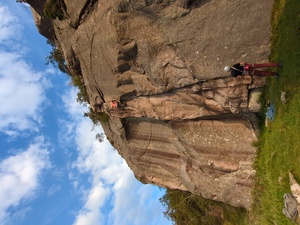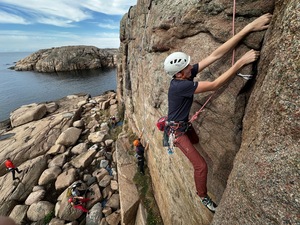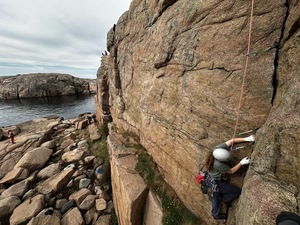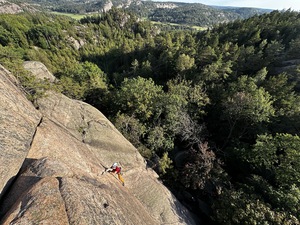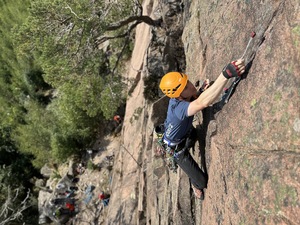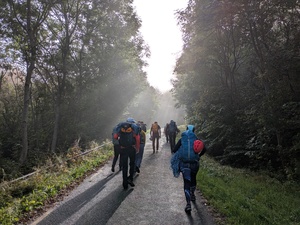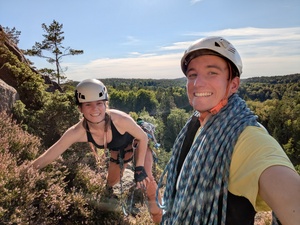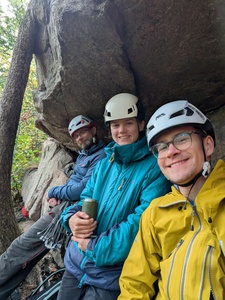Organising Body: RAF Mountaineering Association (RAFMA)
Location: Bohuslän, Sweden – renowned for its granite crack climbing
Dates: 1st – 11th September 2025
Participants: 12 RAFMA members, regular and reservist, including instructors and climbers of varying experience levels
Objectives: Ex Trad Venture 25 was designed to develop the trad climbing skills of RAFMA members and help them understand the process of organising a multi-unit expedition. With a focus on granite crack climbing, the expedition aimed to build members’ confidence on this rock type and style of climbing, and lay the foundations for a network of highly skilled instructors who will be instrumental in supporting the association’s five-year expedition plan to tackle more remote and challenging objectives.
What is Trad Climbing? Traditional (trad) climbing is a style of rock climbing where climbers place their own protective gear (such as nuts, cams, and slings) as they ascend, rather than relying on pre-placed bolts. As trad climbers use removable gear, this allows for a more ‘natural’ style of climbing that leaves the rock face largely unmarked. This type of climbing involves a greater level of self-reliance, as climbers must assess the rock for suitable placements, and manage both the technical and mental aspects of route finding while securing their own safety during the ascent. Trad climbing is one of the foundational skills required for remote expeditionary climbing, where climbers may be exploring areas without pre-established climbing routes.
Expedition Highlights and Challenges: Prior to deployment, the team underwent several months of preparation, including significant effort put into securing funding and organising logistics for the exped including travel, accommodation and equipment for the team. The Ulysses Trust’s support was critical to the success of the expedition. Their funding allowed the team to bring along an additional experienced instructor, which was pivotal in ensuring the expedition had sufficient instructor-to-student ratios in order to allow all participants to conduct lead climbing at an appropriate level to their experience.
The Bohuslän region of Sweden, with its iconic granite crags, provided a unique and challenging climbing environment. The region’s technical granite offered a contrast to the styles of climbing team members were more familiar with in the UK, testing participants’ adaptability and climbing technique. Over the 11 day expedition, the team climbed at a variety of venues on single and multi-pitch routes of varying style. Among the highlights were:
Day 2: Smögen. The team used the first climbing day to refresh their skills, with senior instructors ensuring everyone (including themselves!) had undergone a competency check appropriate to their qualification. The relatively short and friendly crags at Smögen provided the perfect venue for the team to get to know eachother, whilst also admiring the stunning seaside venue surrounded by dazzling pink jellyfish.
Day 3 and 10: Galgeberget. A team favourite, the routes at Galgeberget offered the team a bit of everything. A beautiful crag with single pitches of climbing stretching almost 40m high, the routes here required endurance but also careful gear management to ensure leaders saved enough gear for them to adequately protect themselves in the final metres!
Day 8: Hallinds Klack. The exped lead was the only team member to have previously climbed in Bohuslän, and they were insistent that we all just simply had to test our crack climbing skills at Hallinds Klack. They were right – the cracks here were a real test! But thankfully a test which the team enjoyed, with some of our less experienced climbers also enjoying the opportunity to mock lead some harder routes.
While the climbing itself was challenging, the greater challenges came in group management:
Risk Management: As an expedition with a mix of novice and experienced climbers, ensuring everyone was operating safely but whilst still being able to stretch their comfort zones was critical to ensure everyone was getting the most out of the expedition. Lead climbing under the Joint Services Adventurous Training (JSAT) framework requires a high instructor-to-student ratio and is always a complicated balance of remaining within remit, whilst still finding ways to keep the climbing engaging for more experienced but unqualified team members. The instructing team worked hard to achieve this by carefully planning the groups and activities each day to ensure everyone had plenty of opportunities for personal development.
Use of Rainy Days: Instead of indoor climbing as was initially planned, after consultation with the team, rainy days were used to teach and practice essential rescue techniques. This included practising different scenarios such as how to safely extract an injured climber, providing valuable experience in a controlled environment.
Key Successes: The expedition was deemed a success by all involved. The following achievements were especially notable:
Building Confidence: Team members reported a marked increase in their confidence, not just in their climbing skills, but in their ability to organise an expedition for RAFMA in the future.
Novice Climbers’ First Lead Climbs: By the end of the expedition, several novice climbers had progressed to the point where they were leading their first trad climbs. This was a major milestone, as it marked the successful development of both their technical skills and trad climbing confidence.
Instructor Development: One key success was the development of RAFMA’s qualified instructors. It is not always easy for qualified personnel to get time away from their day job to practice their skills and the exped provided a great opportunity for instructors to build their instructional experience. This is a crucial outcome for RAFMA as it strengthens the organisation’s ability to manage larger, more remote expeditions in the future.
Encouraging Self-Improvement: The team hope that the expedition will act as a springboard for personal growth, with team members encouraged to progress through JSAT qualifications and further develop their leadership and skills.
Personal Impact: One of the most rewarding aspects of Ex Trad Venture was the impact it had on the participants’ personal development. Here’s a quote from one instructor on the expedition:
“What impressed me most about the exped was people that got on well-protected routes at their limits, knowing that they would potentially fall off. And fall off they did! I guess maybe I should try climbing nearer my limits more often, maybe by trying more hard but well-protected routes and not necessarily caring that much about whether I get the route first try.”
Another team member added:
“I’ve always wanted to learn to lead trad climbing and it was amazing to have that opportunity in such a world class venue! I feel like I’ve learnt so much over the exped and I’m really psyched to consolidate my experience back in the UK ready for future RAFMA meets.”
Ex Trad Venture laid the groundwork for future expeditions, helping to create a more experienced and capable team who can support the RAF Mountaineering Association’s ambitious five-year plan to tackle more remote and challenging objectives. The exposure to Bohuslän granite, along with the lessons learned in risk management, team dynamics, and expedition logistics, will have lasting benefits for all involved both in their climbing and beyond. We would again like to extend our sincere thanks to the Ulysses Trust for their invaluable support, which helped make this expedition possible.

